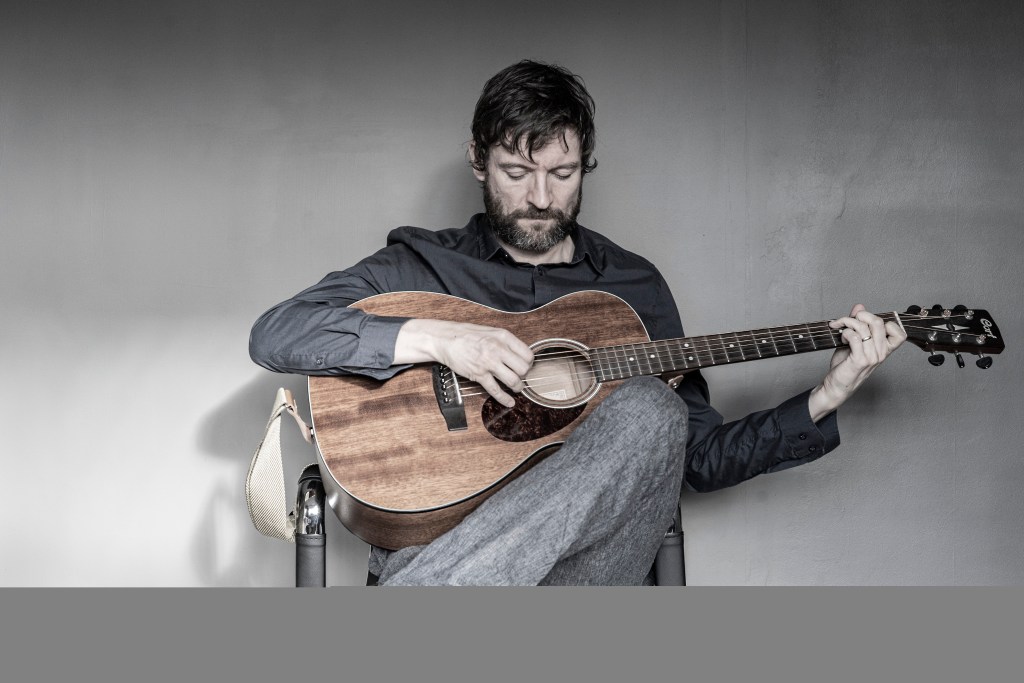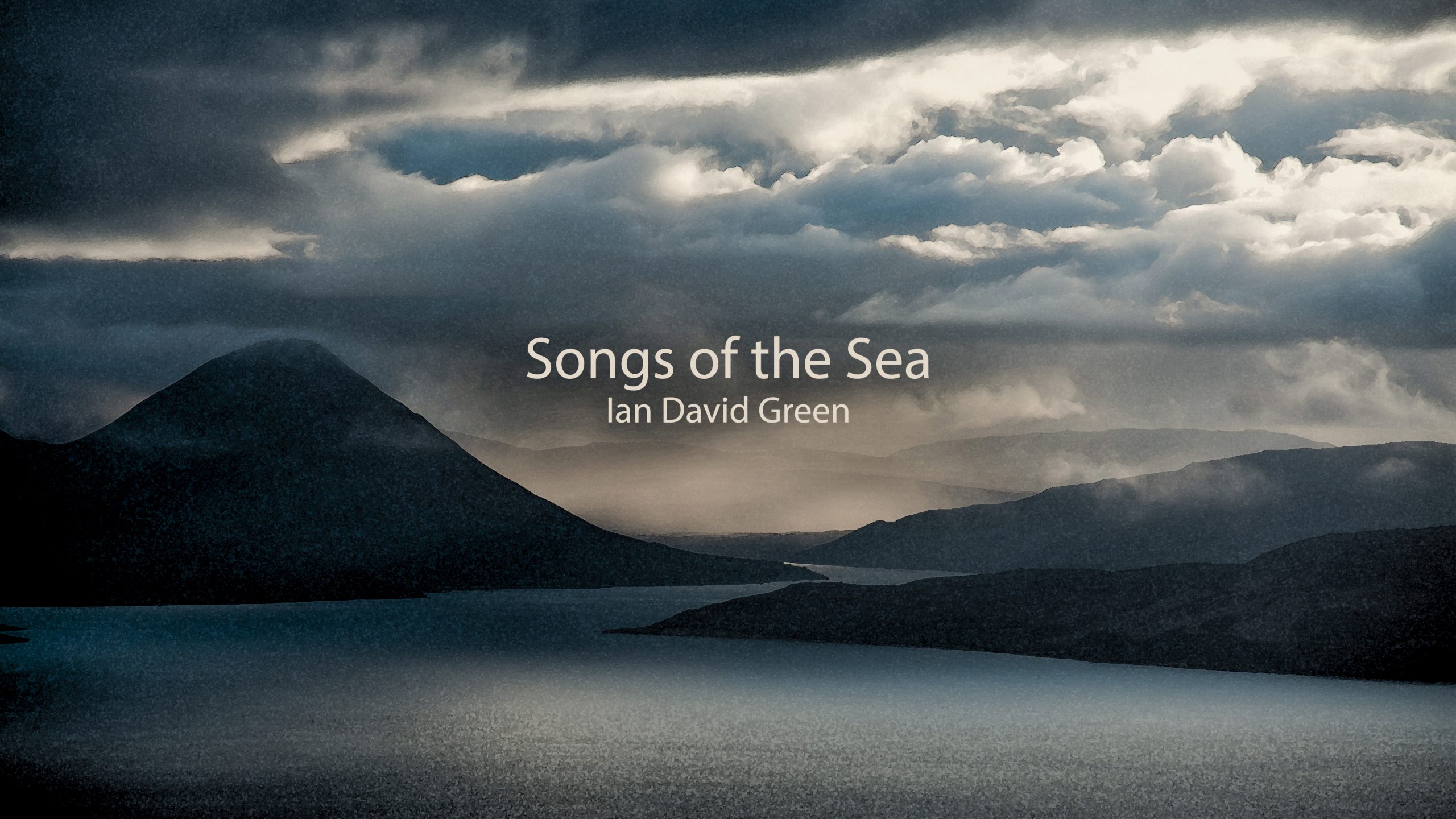Songs of the Sea is Ian David Green’s debut full album, due for release on Bandcamp on 20th February 2021, and what a debut! Green is a singer-songwriter from Liverpool, now living in London.
His musical influences range from folk greats like Bob Dylan, Leonard Cohen and Van Morrison to more contemporary folk / indie / Americana artists such as Damien Jurado, Phosphorescent and Iron & Wine. You can hear all of those influences on this album – and that is a very good thing.
Written as a tribute to his late father, Songs of the Sea explores some big themes though the lens of Green’s own loss and, in the process, Green has produced an album which comes fully-formed, lyrically and musically.
The music on Songs of the Sea is classic modern folk in style, centred on guitar and supported by piano, harmonica, mandolin and more, including the addition of strings by the Scottish Chamber Orchestra. He also makes subtle use of digital sounds and textures, an approach he explored more fully in his darker debut EP, Songs of the Electric Night, which was released in March 2020.
This album gets off to a gorgeous start; lush album opener ‘Oh Beautiful Heart’ is reminiscent of early Mojave 3 with gentle pedal steel. Green’s vocals are an interesting mix of classic contemporary folk with a hint of fellow-Liverpudlian Michael Head from Shack. It’s a really beautiful and wistful song with evocative lyrics that set the tone for the album.
Oh beautiful heart
Still as a whisper moored to the shoreline
Oh beautiful heart
Washed in sun that clings to the treeline
Oh beautiful heart
‘Submarine’ is a change in gear – more uptempo with a dash of pop. Whilst an album called Songs of the Sea is clearly going to be full of lyrics and imagery on that topic, Green manages to do it so deftly, using the sea theme as the foundation for what this album is really about which is memory, place, loss and rebirth.
We stood and turned our faces to the foam Out beneath the waves Boundless blue A million metal messengers alone
‘Born Under a Northern Light’ is a classic modern folk number with instruments that layer and build, almost like waves starting to lap the shore gently and then building as if whipped up by wind. Light and shade and the changing nature of both is imagery that runs through this song, and the whole album.
‘Sailboats‘ starts as a classic folk track but there is a really surprising, but pleasing, musical refrain of an Eastern European or maybe Middle Eastern melody that runs through the song. The Scottish Chamber Orchestra players that provide the strings on this album are particularly apparent on this song and their accompaniment is just mesmerising and perfectly balanced.
Looking – outwards, backwards, forwards – is also a strong theme and it drives this song. The sea seems to be a metaphor for time and the changes it wroughts on our relationships and our memories. Green’s lyricism is just wonderful and he manages to evoke so much with so little. His lyrics feel like they could be taken from some classic British poetry:
Sit not by my grave, son, gaze not to the sea
My father will live in the man you will be
And your sorrow will not profit me
‘Tall Ships‘ seems to be about two young kids (or maybe even adults), excitedly heading down to see the glorious sight of the tall ships coming in to call. I’ve experienced this particular excitement myself and Green’s lyrics capture the awe of the arrival of those big, vibrant sails quite beautifully:
Blue horizon, through the furnace of the light
Sails came shining, our hearts exploded at the sight
Here come the tall ships
It’s a lovely, jaunty, number with only 3 chords (actually a lot of these songs don’t use many chords) that delivers a lot of joy. Green’s vocal melody gives the simple song a level of unbounded joy and he manages to add a Let It Be style ‘na na na…’ without it sounding trite.
I mentioned the theme of looking for direction or place on ‘Sailboats‘, and that theme, probably not unexpected because of the song title, is really explored on ‘Compasses‘. Maybe the theme isn’t just about looking, but also about looking in order to locate oneself either physically, in time, or in relation to others. This is a really lovely, gentle tune. It’s mainly Green on guitar with the occasional strings to add texture and his stunning lyrics.
And these gales of hail we brave
Are ours to face alone
With our own compasses we hold In our eyes
To find our own light
‘Light Will Come‘ is propelled by the sound of hands hitting drums, as other instruments join to build a sense of momentum, like the wind catching the sails of a boat to take it out to sea. It really does create a sense of progression, travelling in a boat with nothing around but the sea and the night sky for company. The lyrically simple chorus “Oh, the light will come”, is full of brass and is just fabulous. You can imagine yourself sat on the front of a boat, wind in hair, the sun dipping over the horizon and not a care in the world.
‘The Voyage of the Queen Marie‘ is probably the most traditional folk story on the album with its references to rum and gold; it’s more pure narrative than the evocative nature of the rest of the album’s tunes. It sill manages to weave in the album themes of light and shade, the changes wrought by time and one’s sense of location in the past, present or future. Some lovely mandolin adds a lightness to the song.
‘Tides‘ evokes how time washes over us and everything, like the rising and falling nature of the water of the title. The song itself is constructed so it feels like it is moving in and out as if the water is coming to shore and then moving away to reveal the new; washing things away. It’s a smart sonic structure and once again the theme of finding oneself, using the sea as an analogy for the movement of time, is really evident.
‘After the Flood‘ is a song in two parts. The first part is an instrumental number that is the ‘flood’ part of the title. The second part of the song is the ‘after’ bit. It really does sound like waking up after a flood, with the dawn breaking and the reassurance that things are going to be OK. It’s like a chant, meditating on the nature of the world where cycles repeat, things die and are reborn.
Album closer ‘Applecross Ridge’ is a beautiful, quiet tribute:
On Applecross ridge, I cast ashes to the sea
On Applecross ridge, I set his broken body free
Whilst clearly very personal for Green and a moving tribute to his late father, Songs of the Sea is also packed full of universal themes, all tied together with the sea as a character, a partner, a protagonist.

Green has managed to pull off an amazing debut, full of stunning lyrical deftness, classic contemporary folk – but with a twist – and an exploration of universal themes of time, change, travel and loss through a very personal lens. It’s an amazingly accomplished debut with a perfectly balanced sound and is a pure, unadulterated joy to listen to from start to finish. I’m kind of hoping that this might be volume one of a series of ‘elemental’ albums about the sea, the earth and the wind, because Green certainly has the ability, in large quantities, to pull it off.
The album personnel were:
Ian David Green (vocals, guitar, mandolin, harmonica, keyboards)
Marty Hailey (vocals, guitar, mandolin, keyboards, bass, drums)
Phil Alexander (accordion)
Marcus Britton (brass)
Will Fry (percussion)
Gordon Bragg (violin)
Rachel Smith (violin)
Felix Tanner (viola)
Niamh Molloy (cello)
Strings and Brass arranged by Marty Hailey
Produced and Mixed by Marty Hailey at Metro13 Music, Edinburgh
Mastered by William Bowden at King Willy Sound, Launceston
Album Tracklist
01 – Oh Beautiful Heart
02 – Submarines
03 – Born Under a Northern Light
04 – Sailboats
05 – Tall Ships
06 – Compasses
07 – Light Will Come
08 – The Voyage of the Queen Marie
09 – Tides
10 – After the Flood
11 – On Applecross Ridge














No Comment